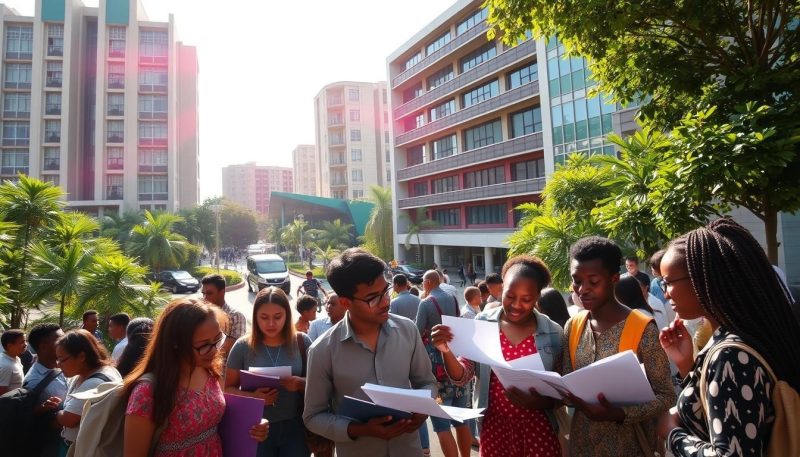Did you know that over 60% of Nigerian students face financial barriers to higher education?
In Nigeria, the cost of education keeps going up. This leaves many students unable to follow their dreams. Scholarships offer a way out, covering tuition, books, and living costs.
There are many types of scholarships, from government grants to international awards. These can change a student’s future.
University fees in Nigeria and abroad are getting higher. This means students need help more than ever. Scholarships can open doors to top universities and special courses. But, many students don’t know how to find these opportunities.

Key Takeaways
- Scholarships help Nigerian students overcome financial obstacles to education.
- Opportunities exist for academic excellence, financial need, and field-specific goals.
- Eligibility criteria vary, requiring careful research and preparation.
- Success stories show scholarships can transform academic and career paths.
- Over 60% of students could benefit from exploring available funding
The Current Scholarship Landscape in Nigeria
Nigeria’s education sector depends a lot on scholarships. These scholarships help students get degrees without worrying about money. There are many government, corporate, and international grant programmes available now.
Government-Sponsored Funding Opportunities
Government scholarships focus on STEM and important fields. The Tertiary Education Trust Fund (TETFund) helps poor students. The Federal Scholarship Board gives awards based on merit.
States like Lagos and Rivers also have programs. They aim at the best students.
Private Sector Educational Grants
- Shell Petroleum Development Company funds engineering and environmental studies through its Shell Livewire Scholarship.
- MTN Foundation’s STEM scholarships target secondary and university students annually.
- Nigerian Breweries Limited awards grants to students in business and agriculture.
International Bursaries for Nigerian Students
Programs like the Commonwealth Scholarships and Chevening Awards attract Nigerian applicants yearly. The Fulbright Program offers research grants. The African Scholarship Hub connects students to global financial aid options.
“Scholarships are Nigeria’s key to unlocking global talent.”
Students need to check deadlines and who can apply. Looking into all options helps find the right support.
Types of Scholarships Available for Nigerian Students
Nigerian students have many scholarship options. These are designed to meet different needs and goals. Knowing about these categories helps find the right fit.
Merit-Based Academic Awards
Merit-based academic awards go to students who excel academically. They look for high CGPA scores or outstanding exam results. For instance, the Nigerian Educational Trust Fund (NETF) Merit Award focuses on students with top grades in WAEC or JAMB exams.
Some awards also consider leadership or extracurricular activities.
Need-Based Financial Aid Programs
These schemes are for students who need financial help. The Federal Government’s N-Power Education Support gives grants to low-income families. Private groups like the FirstBank Scholarship Initiative also help students facing financial difficulties.
They ensure education is accessible to all, regardless of background.
Field-Specific Study Bursaries
Study bursaries are for students in key fields. The Chevron Nigeria STEM Bursary supports engineering and science. The Heineken Skills Development Programme helps with agriculture and entrepreneurship.
These scholarships align with Nigeria’s development goals in important sectors. Research and Innovation Grants
Grants for innovation fund projects tackling big challenges. The Nigeria Innovation Village Grant backs tech startups. The UNDP Youth Innovation Fund supports environmental and social projects.
These awards often include mentorship and funding for prototypes or publications.
“Choosing the right scholarship type means matching your skills and goals to available opportunities.”
Look into these categories to find scholarships that fit your academic strengths, financial needs, or career goals. Make sure to check each program’s eligibility and deadlines.
How to Strengthen Your Scholarship Application

Creating a strong scholarship application requires careful planning. First, understand what each education grant aims to achieve. Use your university’s student support team to check your essays and make your goals clear. Highlight your achievements with specific examples, like “Led a project that increased literacy rates by 15%”.
- Your personal statement should link your past, present, and future. Explain how this grant will help you achieve your goals or make a difference in your community.
- Ask mentors who know you well to write your recommendations. They can talk about your dedication and skills. Stay away from generic letters from people you barely know.
- Make sure your research proposals match the grant provider’s interests. For instance, if the grant is for tech, show how your project addresses digital inclusion.
“Weak applications often repeat generic phrases like ‘I want to help others’ without proof,” notes a Yaba-based admissions officer.
Don’t make common mistakes like spelling errors or wrong qualifications. Always submit your application on time. Late submissions are not accepted. Use bullet points to showcase your leadership roles, volunteer work, or academic projects. For example:
- Volunteer coordinator at XYZ Community Initiative (2021–2023)
- Published research on climate change in partnership with UNDP Nigeria
Prepare for interviews by practicing your answers to common questions. For example, “How will this education grant help you in the long run?” Share examples of your past initiatives. Also, study the grant provider’s website to mention their values in your answers.
Begin early, as some grants need months of preparation. Keep track of deadlines in a calendar. Customize each application to fit the education grant’s focus. These steps will make your application stand out.
Understanding Eligibility Requirements for University Funding
Getting scholarships depends on strict rules. Nigerian students need to know these to succeed. Here are the main points to focus on:
Academic Qualification Thresholds
- Most university scholarships need a minimum CGPA of 3.0/5.0 or similar.
- JAMB scores over 220 are usual for undergraduate courses.
- Grad students must have GRE/GMAT scores and research plans for grants.
Demographic Considerations for Tuition Assistance
Some scholarships focus on certain states or genders. For example:
- Eastern states get 40% of federal education spots.
- Students with disabilities can get special tuition assistance.
- Rural students might get preference in rural programs.
Documentation and Verification Process
Make sure you have these documents to avoid being disqualified:
- Real academic transcripts from past schools.
- References from employers or teachers.
- Proof of income for low-income graduate
Check your documents with NUC-approved agencies to prove they’re real. Remember, international checks can take time. Delays here can mean your application gets rejected.
Conclusion: Securing Your Educational Future Through Scholarship Opportunities
Getting the right scholarship can change your path to higher education. Nigerian students aiming for studying abroad or locally should focus on funding that matches their skills and goals. Use tools like the Nigerian Tertiary Education Trust Fund (NTETF) portal or the Common Application to plan your applications.
Many scholarships are not just for the best students. The African Women Education Fund (AWDF) is one example. Start by checking if you meet the scholarship’s criteria. You’ll need certified transcripts and letters of recommendation. A good application can help you get into STEM, humanities, or vocational training.
Success stories from Nigerian Defense Academy scholarship winners and MasterCard
Foundation Scholars show the power of strategic applications. These graduates are now making a difference in healthcare, tech, and public service. Start by finding three to five scholarships that fit you, then make each application stand out.
College funding is an ongoing journey. Keep up with scholarship news on NUC’s website and connect with alumni from places like the University of Lagos or Covenant University. Every step you take brings you closer to achieving your academic dreams and making a positive impact on your community.
